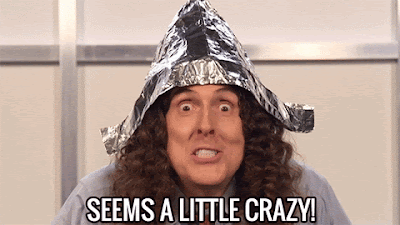Conspiracy theories have been around since people learned to talk. A conspiracy theory is a belief that a nefarious group of individuals has secretly plotted and caused some event or circumstance. Some such theories have foundations in fact and could be true, but have not yet been proven. Other theories are pure fabrications created to further some belief. Some conspiracy theories are just a combination of a few facts with a large dose of pure conjecture. Some are likely or even plausible but lack enough evidence to provide an unquestioned foundation.
 |
| The Deep State |
If you analyze popular conspiracy theories surrounding say the assassination of President John F. Kennedy, there are obviously enough holes in the lone gunman theory and its surrounding unanswered questions that it is easy to suggest better and more plausible scenarios. If such theories analyze all of the available information and come to some reasonable conclusion, I have no problem. On the other hand, those conspiracy theories that take some very limited or narrow view of an event and then go on to invent, through pure conjecture, a story that is easily debunked, those I find troubling and potentially harmful. They are especially despicable when the made-up theory is designed only to hurt someone. I also find fault with those theories that, without foundation, are designed to scapegoat someone to protect a guilty party or responsible group.
In politics, we find the “spin doctors” who take facts and then twist those facts so that they become unrecognizable. Outside the official political spin, we find others who want to support a political cause and they just make up outlandish crap. I find that anyone who begins a conversation with the words, “I heard that…,” I know whatever follows will be, to use polite terminology, crap.
I was recently told a story that began with those dreaded three words. The theory that followed was an easy to discredit tale. It was one of many circulating about the pandemic. There’s the one about Bill and Melina Gates using their money to develop a vaccine that would include some special microchips that would let them monitor everyone vaccinated or could be used for birth control. There was one that blamed the spread of the Coronavirus on 5G cell towers that prompted activists to burn the towers. Then there’s the one about Anthony Fauci who secretly developed this virus with his friends in Wuhan China where they infected the world in order to make billions selling a vaccine. The anti-vax group took a debunked scientific study that tried to connect vaccinations with autism and then denied all scientific evidence to the contrary. You can bombard these people all day long with studies and facts but it all falls on the deaf ears of the “true believers.” You can’t argue with anyone who doesn’t use logic but believes in something just because they know it to be true.
It doesn’t help that our president has used his bully pulpit to spread nonsensical information and theories to further some other aspiration or goal. His desire to get the economy back to where it had been last year so as to improve his reelection chances has him scapegoating the Chinese. He is promoting disinfectant injections, asking if the scientific community could just figure out how to get sunshine into the body, and pushing Chloroquine as a treatment before it could be tested and rejected by science. Conspiracy theories and just general misinformation have found fertile ground in the midst of this pandemic.
I believe that many aspects of the Covid-19 pandemic are so complex that many find it much easier to regurgitate simple explanations. Understanding antibody testing versus CRISPR based DETECTR assay methods is beyond most people outside the medical research field. I don’t understand how viral RNA is extracted then subjected to isothermal amplification by primers, but I trust the scientists who do. If you don’t trust science, the natural response is to believe something much simpler; enter the conspiracy.
Psychologists believe proponents of conspiracies often have intense authoritarian attitudes, high narcissism, and low self-esteem. These same psychiatrists divide conspiracy theories into two groups: ideation and skepticism. The first, ideation, generally involves the government and secret society cover-ups with goals of public influence. Skepticism involves a general belief that people are inherently devious and will go to great lengths to cover-up the truth. While we know generally some of the who & why the question remains; how will we deal with those who are promoting theories that may be harmful?
In some suggestions, professionals recommend asking the person if they really believe what they are saying and in a non-confrontational way offer a possible alternative. You could cite some factual evidence to consider. A second suggestion is to personalize the subject to try to clarify their position. This is thought to evoke emotion that will circumvent some prejudice. My personal experience has been that challenging conspiracy theorists is a waste of time but can occasionally be amusing. You can always say, “You know, I heard that too but the way it was told to me was that the whole thing started a long, long, time ago in a land far, far away. Do you have an hour or two because it’s a really interesting story?” Works every time.




No comments:
Post a Comment